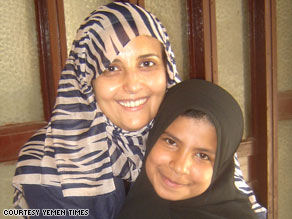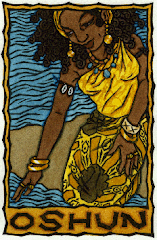Welcome to Gilead, Governor Palin
Tuesday 30 September 2008
by: Cynthia Boaz, t r u t h o u t | Perspective

In Margaret Atwood's dystopian novel, "The Handmaid's Tale," women are confined to a few, limited, gender-based tasks. They are kept in submission by the "Aunts," who reassure them that their subjugation is right. The "Aunts," according to Cynthia Boaz, have a whole lot in common with Sarah Palin. (Photo: Spencer Platt / Getty Images)
If you've ever read Margaret Atwood's dystopian novel, "The Handmaid's Tale," you will recall the key role that was played by the women assigned to be the "Aunts." The story revolves around a futuristic American society in which fundamentalist Christians install a gender-based caste system where each woman is assigned a specific societal function. It is a commentary on the dangerous erasing of the line between church and state in the contemporary United States. The merging of religion and government is carried out by a group of older, white male "commanders" whose propaganda demands that citizens be constantly terrorized into submission and obedience. The resulting regime is Atwood's vision of the worst-case scenario: an American police-state theocracy where every woman's identity is reduced to her sexual attributes, and each is assigned to a category based on her physical qualifications. Subtle references to racist philosophy are mixed into the literalist religious rhetoric.
The attractive young women of reproductive age are the "handmaids"; the attractive but infertile middle-age women are the "wives"; the dark-skinned women of any age are domestic servants, and so on. All women are forbidden from reading or writing. The country is renamed the Republic of Gilead, a reference to the biblical homeland of the patriarchs. And the Aunts - who are middle-aged white women of some previous prestige and education - are especially sinister characters. The primary job of the Aunts is to keep the handmaids (the childbearers) subservient. They go about this by convincing the handmaids that they are powerless and can only contribute to society when they fulfill their God-given responsibility to serve the commanders. The Aunts' job, put simply, is to exploit other women by keeping them submissive and telling them that it's for the good of all (and even more insidiously, that in obeying, the handmaids "empower" themselves.) What makes the Aunts so remarkable is their collective failure to realize that they are simply being used by the commanders to keep other women in line, and their willingness - glee, even - at doing so is simultaneously sad and terrifying. So what compels the Aunts to become traitors to both their sex and their country? First, they believe that their contribution to the repressive social order is righteous, and second, they've found that under this rigid system of social control, they have the illusion of a tiny bit of power.
Does any of this sound familiar? It should. Governor and Republican VP candidate Sarah Palin is the Gileadian "Aunt" manifested. Her sudden emergence onto the American political scene, accompanied by a burst of enthusiasm on the part of many American women, is a surreal example of life imitating art. Much of Palin's rhetoric, tactics and personal philosophy seem to be taken directly from the Auntie training manual. By accepting the position on the GOP ticket despite her astonishing lack of qualifications, Palin signaled that she was prepared to be used - on the basis of her sex alone - in exchange for the promise of status and power. Refer to Palin's RNC convention speech, which was mostly a fawning homage to McCain's patriotism and leadership, sprinkled with condescending references to Obama as "our opponent." Although the lines were delivered with Palin's own folksy vernacular and over-enunciation, it was not Palin, but McCain - or more accurately, the GOP elders at whose feet he finds himself on election eve - who wrote the speech and whose voice echoed through the hall that night in St. Paul. Women who find themselves drawn to Palin because they think she epitomizes the classic "woman who has it all" might want to take a closer look. Sarah Palin was picked for the ticket solely because of - not despite - the fact that she is female. By keeping her sequestered from the media, McCain has confirmed he does not have faith in an unscripted Palin's ability to represent the campaign to the world. By going along with it, Palin is telling us that she's perfectly fine with being controlled by her male superiors. And by portraying herself as the candidate of the empowered woman (while simultaneously promoting policy that is openly hostile to the interests of working and middle-class American women), she reveals the sad truth about how little progress we've actually made.
Lest we think that Senator McCain is hesitant to keep pushing this stereotype in the face of abysmal performances by Palin in news interviews, the most recent reports reveal that his campaign intends to hype the expected wedding between Palin's pregnant daughter and her boyfriend, the date of which is apparently being set just prior to the November election - with McCain and Palin sitting in the front row. Is it possible that Sarah Palin is just blissfully un-self-aware, or is it that she so eager for any illusion of power that she'll allow herself to be marketed no matter what the cost to the dignity of all women? If Palin were truly an empowered woman, she would have refused to allow herself and her daughter to be used in this manner - to assist a party whose rhetoric and imagery promote the ideal woman as deferential to established norms rather than acting as an independent - or critical - thinker. If her selection was intended to signal to American women that empowerment is possible, why is Palin being kept under lock and key? Clearly, this is not an individual whose intelligence or perspective McCain respects, or else he would permit her to speak for herself. To continue pretending that Palin's selection was anything other than an attempt to manipulate the voting public on the basis of a straitjacketed view of sexual roles is a dangerous lie that no American of any gender can afford to abide.
--------
Cynthia Boaz is assistant professor of political science at Sonoma State University.






















